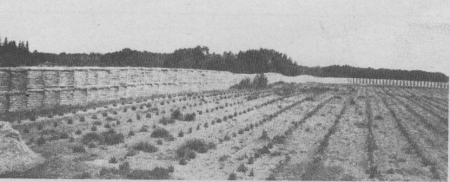
There's no reason for farmers to suffer damage to hay stacks caused by deer, according to Saskatchewan farmer Kingsley Schappert who came up with a simple idea that he says solved his problem with white tailed deer.
Schappert's troubles began when he got into the tree nursery business in an effort to diversify his farming operation. He planted 30 acres of shade trees but deer took their toll on the young trees.
At first Schappert considered building a deer-proof wire fence but he couldn't justify the cost. His solution was to put up a "no cost" straw bale fence.
There was a surplus of straw in his area last year and not much of a market for it. "The original idea was to put one row of bales around the field but people told me deer could easily jump over that," says Schappert. So he constructed a double layer of bales standing end-on-end, making a fence 12 ft. high and 6 ft. wide all the way around the 30-acre field.
There are somewhere between 1,200 and 1,400 bales in the fence, most of which came off a 300 acre wheat field. He's not certain how many bales there are because the counter on his baler quit working while the bales were being made.
The fence has been 100 percent successful. Not a single deer has made it over the fence since it went up a year ago. Schappert expects the fence to last 5 to 10 years. When it does deteriorate, he plans to spread the straw in among the trees as mulch.
"We don't figure it cost us much since we already had a baler and the straw," Schappert told FARM SHOW. "We put the bales in place when we had time. You could bale anything -- weeds, cornstalks, or other crop residue. It wouldn't take nearly as many bales to protect a hay stack or a garden area."
Before building the fence, Schappert worried the straw bales would attract mice in among his trees. But he says mice stay in bales and leave the trees alone, which makes them easier to catch for foxes and coyotes, which he frequently sees running across the top of bales looking for the rodents.
(Reprinted from Grainews, Winnipeg, Manitoba, Canada)
